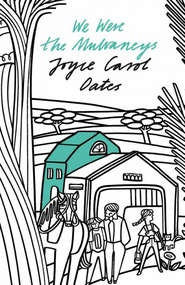По всем вопросам обращайтесь на: info@litportal.ru
(©) 2003-2025.
✖
A Widow’s Story: A Memoir
Настройки чтения
Размер шрифта
Высота строк
Поля
And here are Ray’s colored pencils, that will need sharpening.
These items, I place carefully in my black tote bag. Beautiful cut flowers—white and yellow mums, red carnations, purple iris—in vases, from friends—these I will leave behind.
(Have I thanked our friends for these flowers? I don’t think so—I don’t remember. So many messages on our answering machine at home—I haven’t answered. And many messages deleted by accident, or in haste.)
The beautiful large Valentine card, signed by our friends—for Ray—to cheer him up—this, I should have brought to him, yesterday.
On this Valentine the heartfelt wishes of our friends—I am staring at the words in a sort of trance—Dear Ray wish you were here. Ray—be well soon! Ray you must come back to us soon, we love you and miss you so much. Ray here’s to sausage in our future! Ray please rest and rest and rest! It takes time. And we want to see you soon. Ray heal well! We all miss you tonight. Come home soon! Ray—I’m glad to hear you’re feeling better and hope you will be entirely recovered very soon. Dear Ray—I once knew a man named Ray, who I thought was very okay, he liked to read, while drinking mead, the wonderful man who was Ray . . .
It seems horrible to me, unconscionable—how could I have been so stupid, selfish, neglectful—I hadn’t brought this Valentine for Ray to see. Naively thinking I would keep it for him, to give to him at home.
“And now it’s too late.”
So many mistakes I’ve made, and am making. This is new to me, as if I have crossed over to another place where continually I will be making mistakes, stupid mistakes, contemptible mistakes. Soon I will learn that a widow is one who makes mistakes.
In the closet are Ray’s clothes, shoes. A laundry bag into which Ray has put soiled underwear and socks. There is his jacket—the one he’d worn on Monday morning. There, the striped blue flannel shirt, and the trousers. I am fumbling to remove Ray’s clothes from the hangers, the blue striped shirt falls to the floor . . . In a panic I am thinking I will have to make two trips to the car. I will have to make two trips to the car.
If I leave this room, I will never be able to return. I will never be able to force myself to return.
I should call someone, a friend. I should call for help. I can’t carry these things by myself! Not in one trip.
Yet, I feel shy about calling friends. It is 1:30 A.M.—a terrible shock to be awakened by a ringing phone, and news of a friend’s death.
Better not. Better just go home.
In the morning will be soon enough. And call Ray’s sister who lives in Connecticut, whom I have never met.
And my brother, and sister-in-law.
Ray has died. He was in the hospital for not quite a week with pneumonia, he was getting better but—he died.
Instead of leaving the hospital room, I lift the phone receiver. I must have decided to call a friend, friends—this seems to be what I am doing, after all.
And the ringing in the distance, invading another’s sleep.
In this way, at this moment, the Widow acts instinctively—she does not drive home alone as perhaps she’d fantasized and she does not do harm to herself as perhaps she’d fantasized—she calls friends.
But only friends whose telephone numbers she seems to have memorized.
Chapter 16 Yellow Pages (#ulink_417162a5-0b36-5104-a7f5-be5cf6a89962)
You made my life possible. I owe my life to you.
I can’t do this alone.
And yet—what is the option? The Widow is one who has discovered that there is no option.
There is a plastic bag provided for me, into which I can put my husband’s smaller things. I am determined to carry everything in one trip and somehow, I will manage.
This determination to manage—to cope—to do as much unassisted as possible—is the Widow’s prerogative. You might argue that it’s a sign of her wish to appear to be—which is not the same as being—self-sufficient; or you might argue that it is a symptom of her derangement.
But then, in the early minutes/hours/days of Widowhood—what is not, if examined closely, a symptom of derangement?
These books Ray has been reading—which he’d asked me to bring from home—and his shoes—in the plastic bag these objects are strangely heavy, and unwieldy. One of the books is a bound galley in which I’d been reading intermittently at Ray’s bedside, and from time to time reading aloud to him an interesting passage from it—a book about the human brain by a Princeton neuroscientist whom I have met—the jaunty title is Welcome to Your Brain. The sight of the galley fills me with a sick, sinking sensation. . . .
I will take it home. I will hide it on a shelf. Never can I bring myself to look into it again.
“Honey? I think they want me to go now . . .”
My voice is thin, wavering. Perhaps it isn’t a voice but a faintly articulated thought.
Staring at Ray on the bed. It is not natural—instinctively you grasp that this is not-right—to see a person so composed, unmoving.
Yet there is the sensation—visceral, uncanny—that the person who is lying so still, not breathing, or breathing so faintly that it’s undetected, is well aware of being observed, and observing you through shut eyes.
Helplessly I am standing here, thinking—the thought comes to me—There will never be a right time.
Meaning, a time to leave the hospital room.
Meaning, a time to turn my back, and walk away.
To turn my back on Ray—my husband. How is this possible!
Awkwardly, and very slowly, in small steps like a blind person I back my way out of the room. Very clumsily, for my arms are full.
I am trying to carry too many things. So frequently lately I’ve been dropping things, surely I will drop something now. I am in dread of calling attention to myself. I am in dread of losing control in a public place. Suddenly it seems to me—I’ve left my handbag behind—I can’t quite see what I am carrying, in my arms. A wave of panic sweeps over me—though how trivial is this!—how ridiculous—at the possibility of losing my handbag, my car key, house key.
This is the terror: I will lose crucial keys. I will be stranded, marooned. I see myself at the side of a highway—in the dark—frantically signaling for—what?—headlights rush past, blinding. Or maybe this is a dream. Recurring dreams of being lost from my husband are my most frightening dreams but this too is very frightening, for it is so very plausible. Ray is likely to be in charge of keys—to know where a spare key might be kept, outdoors—but now I am obsessed with keys, searching through my handbag for keys a dozen times daily. The relief of finding a key, which might have been lost!
In fact I will lose some things. I will discover that a pair of dark-tinted glasses is missing out of my handbag. They must have fallen out when . . .
I will leave behind Ray’s glasses! I will be utterly unable to comprehend how I could have overlooked them, hadn’t I held them in my hand . . .
Ray’s wristwatch—this, I haven’t left behind.
At the brightly lit nurses’ station—near-deserted at the hour of 1:43 A.M.—I tell one of the nurses that my husband is in room 539, and he has died, and what do I do now? It is the height of naivete, or absurdity, to imagine that the nurses are not well aware of the fact that a patient has just died in Telemetry, a few yards away; yet, I am trying to be helpful, I am even asking with a faint smile, “Do I—call a funeral home? Can you recommend a funeral home?”
The woman to whom I’m speaking—a stranger to me—looks up with a frown. I don’t see in her face the sympathy I’ve seen in the faces of some others. She says, “Your husband’s body will be taken down to the morgue. In the morning, you can call a funeral home to arrange to pick it up.”
This is so shocking to me—so stunning—it’s as if the woman has reached over the counter and slapped my face.
It! So quickly Raymond has ceased being he, now is it.
I feel that I might faint. I can’t allow myself to faint. I lick my lips that are horribly dry, the skin is cracking. Though I can see that the nurse would far rather return to whatever she’s doing at a computer, than speak with me, hesitantly I ask if she can recommend a funeral home and she says, with a fleeting smile, perhaps it’s an exasperated smile, that she could not recommend any funeral home: “You can look them up in the Yellow Pages.”
“The ‘Yellow Pages’?”—I cling to this phrase, that is so commonplace. Yet I seem not to know what to do next.
Another time I ask if she can recommend a funeral home—or if she could call one for me—(such a request, such audacity, I must be desperate by this point)—and she shakes her head, no.











